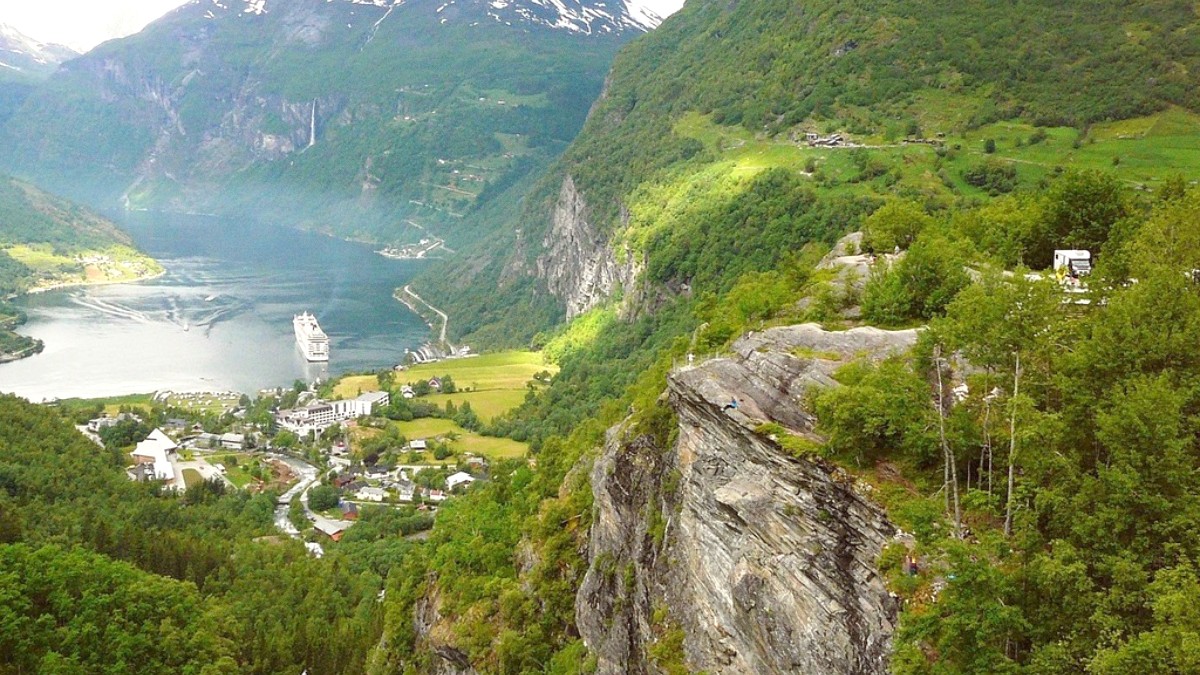
Norway
Geirangerfjord, part of an UNESCO site, has conservation and sustainable management. Support eco-certified operators or follow local guidelines. Waste management and recycling systems are excellent; use designated bins. Water-saving practices are encouraged. Consider carbon offsetting for flights. Choose lower-impact transport like electric boats or public transport.
Support local businesses and artisans. Respect traditional life in remote communities. Be polite and patient. Ask permission before taking photos of people. Avoid disturbing local residents. Maintain quiet in religious sites like Geiranger Church. Dress respectfully when visiting the church.
Your choices as a traveler can have a direct positive economic impact. Choose locally owned accommodations, restaurants, and tour operators to keep economic benefits within the community. Seek genuinely local souvenirs. Spend money at local establishments to sustain jobs and services. Norway's strong labor laws and high social standards mean exploitation is not a concern.
Your actions minimize the impact of tourism.
Geirangerfjord is part of the West Norwegian Fjords UNESCO World Heritage Site. This designation highlights conservation and sustainable management. Initiatives focus on waste management and promoting electric vehicles and boats.
Seek out accommodations and tour operators with environmental certifications. These certifications indicate a commitment to sustainable practices.
Consider offsetting carbon emissions from your flights to Norway. Seek reputable carbon offset programs.
Bring reusable items to reduce waste during your travel.
Support local businesses and artisans who maintain traditional crafts. Respect the traditional way of life, notably in smaller communities. Avoid actions that may disrupt peace or traditions.
Always ask for permission before photographing people, especially children. Be mindful of not disturbing residents, their homes, or property. Avoid intrusive photography. Recognize that while the landscape is public, people's lives are private.
For ethical tour experiences, consider operators like G Adventures, known for their responsible travel practices.
Your choices as a traveler have a direct positive economic impact on the local community.
Choose accommodations, restaurants, and tour operators that are locally owned and operated. This approach helps ensure that the economic benefits of tourism remain within the community.
When buying souvenirs or gifts, look for items genuinely produced locally by artisans or small businesses. This practice supports fair wages and traditional craftsmanship.
Community-based tourism efforts direct funds to local residents and initiatives.
Norway has strong labor laws and high social standards. Businesses you interact with generally operate ethically, without concerns of labor exploitation or harmful practices.
By choosing local, you strengthen the community's economy and uphold its traditions.
Purchase authentic, locally produced souvenirs and crafts to support artisans directly.
Your spending supports the resilience and self-sufficiency of small villages.
Local businesses often provide personalized and knowledgeable service.
For contributions to local causes, research reputable local charities or environmental organizations if you wish to donate.
Respectful interactions and awareness of local norms enhance your travel experience.
Be polite and patient in your interactions. Norwegians are generally reserved but welcoming once engaged. Acknowledge local customs and show appreciation for their way of life.
Always ask for permission before taking photos of people, especially children. Be mindful of not disturbing local residents, their homes, or their property when taking photographs.
Choose accommodations, restaurants, and tour operators that are locally owned and operated. This helps ensure that the economic benefits of tourism remain within the community.
When purchasing souvenirs or gifts, look for items that are genuinely produced locally by artisans or small businesses. This practice supports fair wages and traditional craftsmanship.
Norway has strong labor laws and high social standards. You can trust that the businesses you interact with operate ethically.
Businesses here follow strict regulations regarding employee compensation and rights.
High standards for workplace safety are the norm across various sectors.
Exploitation of labor or harmful practices are not typical concerns for tourists here.
Charitable giving is not typically applicable for tourists in this region. If you wish to contribute to local causes, research reputable local charities or environmental organizations directly.
Your choices truly contribute to preserving Geirangerfjord's natural beauty and supporting its local communities. Embrace responsible travel by observing local customs, respecting the environment, and making informed economic choices.